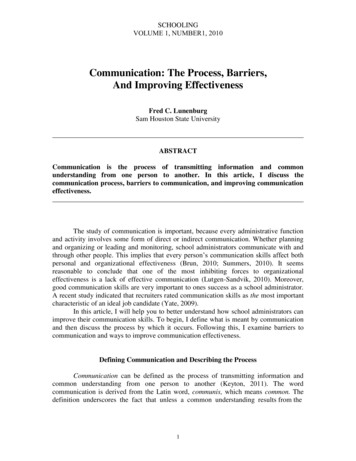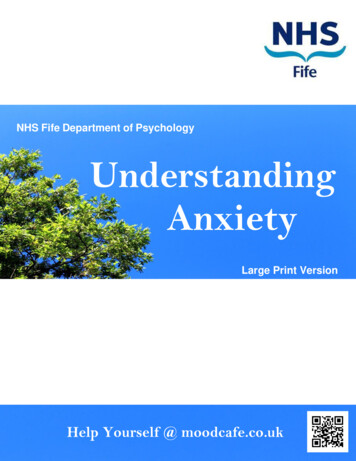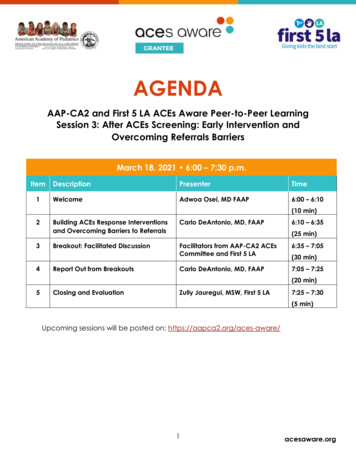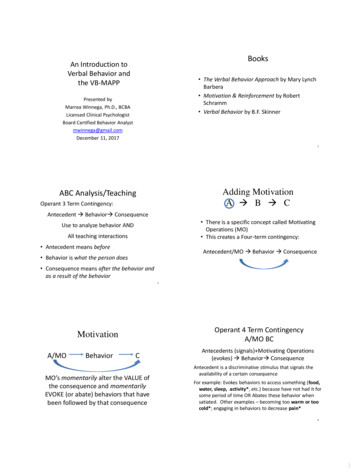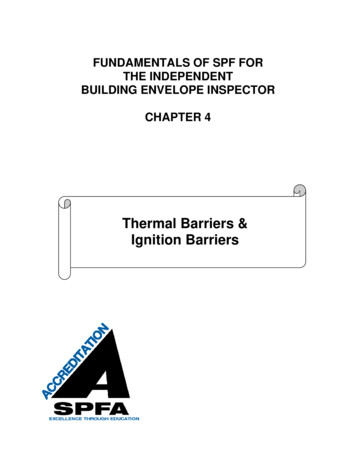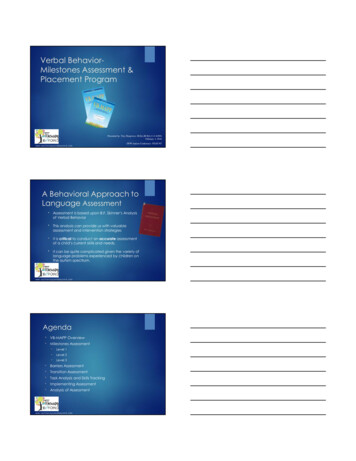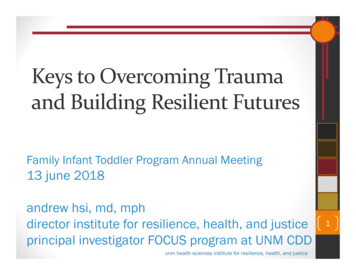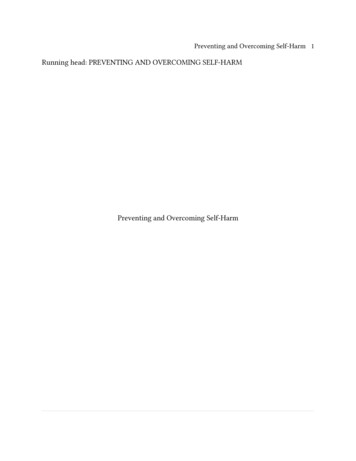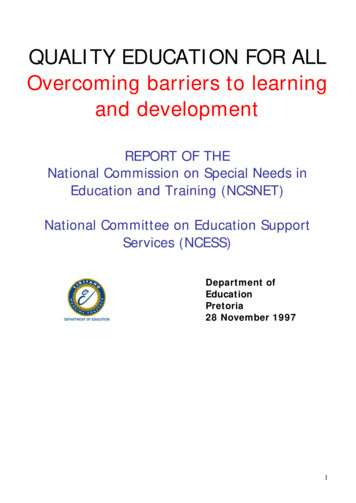
Transcription
QUALITY EDUCATION FOR ALLOvercoming barriers to learningand developmentREPORT OF THENational Commission on Special Needs inEducation and Training (NCSNET)National Committee on Education SupportServices (NCESS)Department ofEducationPretoria28 November 19971
1. THE PROCESS1.1. PURPOSE AND SCOPE OF THE NCSNET/NCESS1.1.1 Overall PurposeThe National Commission on Special Needs in Education and Training (NCSNET) and the National Committee forEducation Support Services (NCESS) were appointed by the Minister and Department of Education to investigateand make recommendations on all aspects of ‘special needs’ and support services in education and training inSouth Africa. The focus of the investigation is on the development of education to ensure that the systembecomes more responsive to the diverse needs of all learners.1.1.2 Scope1.1.2.1 All Aspects and Levels or Bands of EducationThis investigation covers all levels or bands of education: early childhood development, general education andtraining, further education and training, higher education, and adult education.It should be noted that all issues, findings and recommendations outlined in this Report refer to all the bands ofeducation referred to above unless specific reference is made to a specific band. At times this specificity isnecessary owing to particular characteristics of that phase of lifelong learning. In an attempt to highlight theimplications for all bands of education, Chapter Eight provides a summary of the recommendations of the Reportfor each of the bands.The investigation covers all aspects of education. This includes matters to do with the organisation, governanceand funding of education as well as all components of the curriculum. Curriculum can be defined as everythingthat influences the learner, including: who teaches and is taught; the content of what is taught; how it is taught;the medium through which it is taught; how learning is assessed; teaching and learning materials and equipment;the way in which learning programmes are organised; and the physical and psychosocial environment withinwhich teaching and learning takes place.Historically the areas of ‘special needs’ or specialised education and support services have been considered as an‘add-on’ or marginal consideration in the administration of education in South Africa and in other parts of theworld. Those working in these areas have also tended to focus primarily on the traditional school-goingpopulation rather than on the full lifelong learning span. The NCSNET/NCESS has deliberately adopted acomprehensive approach, considering all aspects and bands of education. This approach is based on the beliefthat the central challenge facing education is that of recognising and addressing the different or diverse needs ofthe entire learner population and minimising, removing and preventing barriers to learning and development,thereby promoting effective learning among all learners. Enabling mechanisms need to be developed to ensurethat the curriculum becomes responsive to the needs of all learners and that additional support is provided tothose who need it.1.1.2.2 ‘Special Needs’Within the context of the terms of reference of the NCSNET and NCESS, ‘special needs’ in education refers toneeds or priorities which the individual person or the system may have which must be addressed to ensureeffective learning.Acknowledging that ‘special needs’ often arise as a result of barriers within the curriculum, the centre of learning,the system of education, and the broader social context, it is suggested that instead of referring to ‘special needs’we should refer to barriers to learning and development. This is discussed in some detail in Chapter Two.In order to understand the scope of the NCSNET and NCESS it is important to look at the specifics regardingthese barriers to learning and development. It is clear that all learners may either permanently or temporarilyencounter or experience barriers to learning and development. In particular, however, this includes those learners2
who have historically been neglected in the system, including: learners with disabilities who may need to usespecialised equipment or assistive devices to access the curriculum and participate in the learning process;learners who experience some form of learning breakdown as a result of a particular barrier; and learners whoare at risk for personal and social reasons.Barriers to learning and development can occur within all aspects of the system and curriculum, the centre oflearning, the education system, and the broader social context. Examples of potential barriers to learning anddevelopment are provided in Chapter Two.The approach of NCSNET/NCESS to ‘special needs and support’ is located within the broad initiative of currentdevelopments in South Africa which focus on the development of quality education for all learners.1.1.2.3 Support ServicesEnabling mechanisms need to be developed to ensure that the system and the curriculum are continuouslytransformed to address the needs of all learners. This requires the provision of additional support to learners andthe system where needed. This brings us to the area of support services.‘Education Support Services’ include all human and other resources that provide support to individual learners andto all aspects of the system. While these services attempt to minimise and remove barriers to learning anddevelopment, they also focus on the prevention of these barriers and on the development of a supportivelearning environment for all learners.Support required by learners or the system could include: teaching and learning support (including particularteaching and learning interventions - e.g. academic development programmes, enrichment programmes); theprovision of assistive devices (e.g. Brailling facilities, specialised communication devices, appropriate informationtechnology); general and career guidance and counselling; various forms of therapeutic support (medical,psychological, occupational, speech, physiotherapy); nutritional programmes; social interventions; parentalsupport; teacher training and support; organisation development; and curriculum development.Support has traditionally been provided by specialist education support personnel, including the following serviceproviders: learning support teachers (e.g. listening and language teachers, ‘remedial’, ‘special class’, and ‘specialneeds’ teachers, classroom assistants, social workers, doctors, nurses, psychologists, therapists, counsellors,nutritionists, child and youth workers and houseparents.Support can and should also be provided by members of the learning community (e.g. learners, parents,educators) and other community resources (e.g. ), SA Sign Language interpreters, communication facilitatorsvolunteers, peer-counsellors, community workers, traditional healers, community-based rehabilitation workers,organisation development consultants non-governmental organisation, community-based organisations, disabledpeoples’ organisations, welfare organisations, religious organisations and traditional healers).1.1.2.4 Amalgamation of NCSNET and NCESSHistorically a division has existed between education support services and ‘special needs education’. A furtherdivision has existed between these areas of education provision on the one hand and mainstream education. Thisfragmentation has isolated learners who experience barriers to learning and development. Different services haveusually been organised into separate and often rigid bureaucracies which have made working together difficultand have been difficult to access. ‘Special need’ and support services have tended to focus on the delivery of3
highly specialised interventions directed at a limited number of individuals in predominantly urban areas, andproblems in the education system itself have seldom been addressed.In an integrated system, a range of services which work together to meet the needs of all learners and otheraspects of the education system should be developed. These services should form an integral part of theeducation system as a whole.If we accept that ‘special needs’ relates primarily to the need of the system to become able to respond todiversity and adequately promote learning and development for all, the role of support services would be tominimise, remove and prevent barriers to learning and development to ensure effective learning anddevelopment of all learners. Support services can play a fundamental role in ensuring that all learners have equalaccess to the education system and are able to participate optimally in the learning process.In the early stages of the work of the NCSNET and NCESS it became evident that the links between these areaswere so close that they required a joint investigation. The first meeting of both bodies was held in mid-November1996. The NCSNET and NCESS initially commenced their investigations within separate task groups. By the thirdmeeting in January 1997, it was evident that the investigations overlapped in so many ways that it was necessaryto amalgamate and conduct both consultative and research work through joint structures and processes. Theexisting structures (refer end of this chapter) reflect this amalgamation.1.2. TERMS OF REFERENCEThe terms of reference of both the NCSNET and NCESS were developed during 1995 by forums of stakeholders inthe areas of ‘special needs education’ and ‘education support services’ respectively.The terms of reference, published in government gazettes (refer Appendix A), indicated that the following areasshould determine the focus of investigation: Obtaining a ‘picture’ of the current situation in terms of needs and the provision of specialised education andsupport servicesIdentifying needs and priorities that should be addressedDeveloping a conceptual framework for ‘special needs’ and support services within the context of a ‘holisticand integrated’ approach. This includes clarifying the relationship between Education Support Services (ESS)and Education for Learners with Special Education Needs (ELSEN), and identifying how the subject ‘Guidance’is located within an ESS frameworkDeveloping a future vision, principles and strategies for education provision in terms of ‘special needs’ and‘support’, with a particular focus on inclusion and the strategy of mainstreamingInvestigating the implications of the above in terms of the education system as a whole, including curriculumand institutional developmentInvestigating the implications for the organisation and governance of schooling and other levels of educationInvestigating the implications for staffing of educators and education support personnelInvestigating the implications for the pre- and in-service training (human resource development) of educatorsand education support personnelInvestigating the implications in terms of finances and fundingDeveloping a strategic implementation planAll of the above were to be located within the framework of the new Constitution of South Africa (1996), theWhite Papers on Education and Training (1995/6), and other relevant policy documents.The NCSNET and NCESS were charged to conduct research and consult widely, including all relevant stakeholdersin the process. They were given 12 months to complete their investigation and to make recommendations fornational policy.14 members were appointed to the NCSNET, and 10 members to the NCESS. The terms of reference indicatedthat they would be expected to work 2 days per week for the period concerned. The NCSNET was required towork closely with the National Co-ordinating Committee for ELSEN (NaCoCo for ELSEN), while a Reference Group,comprising representatives of all relevant stakeholders in the area of ESS, was appointed for the NCESS.4
One chairperson, Professor Sandy Lazarus, was appointed to chair the NCSNET and the NCESS. Both bodies wereprovided with Secretariat support: a co-ordinator was provided for the NCSNET and one for the NCESS, and asenior and a junior secretary were provided to serve the two bodies jointly.Both the NCSNET and NCESS were accountable to the Minister of Education and Director General of theDepartment of Education, and reported to both the HEDCOM (Heads of Education in the nine provinces) and theCEM (Council of Education Ministers).1.3. THE PROCESS1.3.1 Pr inciples of WorkingThe following principles have guided the functioning of the NCSNET/NCESS: Amalgamation of the NCSNET and NCESS, to address historical fragmentation in these areasA commitment to democratic processes within the NCSNET/NCESS. This has entailed attempting to conductall the work of the NCSNET/NCESS in a participatory and transparent manner, involving all members indecision-making and in all areas of the workA participatory approach to public involvement, attempting to involve relevant stakeholders in the fullestmanner possibleA ‘listening’ approach forming a basis of both research and consultation work - the aim being to learn asmuch as possible from all relevant sources before drawing up recommendations. This listening does not,however, exclude a critical engagement with contributions madeFinding indigenous responses to South Africa’s needs. While international opinion and trends are important toconsider in the process of developing policy, the thrust has been on radical problem-solving and solutionseeking in an attempt to address our local needs.1.3.2 Overview of the Year’s WorkThe following Year Plan was developed to guide the work of the NCSNET/NCESS. While minor adjustments weremade owing to the slow start of the work of the NCSNET/NCESS, this programme was broadly adhered to.1996November/December:1997January-MarchInitial setting up of NCSNET/NCESS structures andprocessesNCSNET/NCESS introduced to key stakeholders andthe publicJanuary-AugustSite visits, covering all bands of educationJanuary-JuneResearch Task Groups conducted their investigationsand made initial recommendationsPublic submissions received, analysed, and fed intothe Task Groups’ workMarch/AprilAppointment of commissioned researchers.Provincial multilateral workshops held in all nineprovinces.Specific stakeholder workshops, and workshops withDepartments of Education and other governmentdepartments.[Focus for workshops: Proposed vision, principlesand strategies for the future]5
July/AugustDevelopment and release of Public DiscussionDocument, outlining the NCSNET/NCESS’s initialfindings and recommendations, for public debate.August-SeptemberFurther investigations pursued in areas inadequatelycovered thus farAugustWorkshops with NaCoCo for ELSEN and ESSReference Group, and national stakeholders whohad been insufficiently consulted thus farSeptemberPublic Hearings in all nine provinces.National Conference including representatives ofkey stakeholders, government departments, andinternational consultantsOctober/NovemberAnalysis of verbal and written submissions on thePublic Discussion Document.Development of Final ReportPresentation of Report to Minister BenguDuring the period concerned, the NCSNET/NCESS met as a collective for ten brief periods. The NCSNET/NCESSmet with their reference groups (NaCoCo for ELSEN and ESS Reference Group) four times during this period.Further consultation with the reference groups occurred through regular circulation of documents.1.3.3 Public ParticipationThe principle of involving key stakeholders in the investigation was considered to be important. This is in line withthe democratic ethos of public policy development that is emerging in South Africa.The NaCoCo for ELSEN and ESS Reference Group - set up to assist the NCSNET/NCESS in its work - played a keyrole in mediating information flow between the NCSNET/NCESS and key stakeholders. It was important to workthrough these representatives of key stakeholders to ensure that all relevant groups and persons were keptinformed of the process.In order to further facilitate public participation, members of NCSNET/NCESS formed provincial teams which wereresponsible for conducting site visits, participating in stakeholder meetings, and facilitating provincial workshopsand Hearings in all nine provinces. Appendix E provides the details of participation achieved through theseprocesses.During March the NCSNET/NCESS’s first public discussion document, outlining the NCSNET/NCESS’s initialproposals for a future vision, principles and strategies, was released to the public. The document was used as abasis for workshops held in all nine provinces during March and April. Debate and input was facilitated withinthese forums, enabling the NCSNET/NCESS to gauge the public’s response and views. Based on the generalsupport for the vision, principles and broad strategies outlined, the NCSNET/NCESS adopted this framework as abasis for all their further work and recommendations.On the basis of written submissions, workshop debates, research conducted, and debate within theNCSNET/NCESS itself, a further Public Discussion Document outlining the NCSNET/NCESS’s initial findings andrecommendations was compiled and released in August for public debate. Members of the public were providedwith an opportunity to make submissions in person and to send written submissions on this Public DiscussionDocument. Public hearings were held in all nine provinces. All who wished to make a submission in person wereprovided with an opportunity to do so. Representatives from all key stakeholders made submissions through thisprocess.6
The NCSNET/NCESS’s consultation process culminated in a National Conference which was held at the end ofSeptember. The Conference included key stakeholders within South Africa as well as a number of invitedinternational experts. The key purpose of the conference was to facilitate a common understanding of the majorthrusts of the NCSNET/NCESS and to discuss and debate key areas of concern. Areas that formed a focus for theconference included: development of an inclusive society; the challenge of redress; the challenge of intersectoralcollaboration and co-operative governance; and implementation of policy in the different bands of education.Wherever possible, the media was used to inform and invite members of the public to participate in the process.This was a limited process due to severe resource constraints, but it did achieve and facilitate some publicawareness and involvement of members of the public in the process.The final recommendations outlined in this Report were developed in the context of an analysis of all submissionsmade. The outcome, in the form of policy recommendations to the Minister and Department of Education, do not,however, reflect the positions, needs and expectations of everyone. While most of the views were able to beaccommodated, some aspects of the recommendations reflect some form of compromise or favour one positionmore than another. Having said this, however, the NCSNET/NCESS has striven to achieve national consensuswherever possible. The fundamental yardstick for deciding on what position to take was determined by theframework of principles developed by the NCSNET/NCESS in consultation with stakeholders. The Constitution ofSouth Africa underpins these principles.1.3.4 The Research ProcessThe research conducted for the NCSNET/NCESS has been structured through joint Task Groups, focusing on themain aspects of the terms of reference of the NCSNET and NCESS:Task Group One:Task Group Two:Task Group Three:Task Group Four:Task Group Five:Task Group Six:The Current Situation* Historical, legislation, and policy analysis* Situation and needs analysisFuture Vision, Principles and StrategiesCurriculum and Institutional DevelopmentOrganisation, Governance and Funding(including Staffing and Assessment)Human Resource Development of Educators andService ProvidersStrategic Implementation PlanThe Task Groups comprised core members (members of NCSNET/NCESS), commissioned researchers, andadditional consultants (refer Appendix C). Unfortunately, owing to time and other constraints, not all additionalconsultants initially identified for the Task Groups were able to be adequately included in the process. Theprimary function of the Task Groups was to conduct research in all areas relevant to the Task Group focus,utilising literature from within and outside of South Africa, and, where appropriate and possible, conductingprimary research in South Africa. Each Task Group was then responsible for developing research reports anddiscussion documents. Submissions received from the public as well as reports on site visits and meetings andworkshops were incorporated in the development of these documents. These documents were then used as abasis for the development of the Public Discussion Document released in August and for the development of thisReport.Additional research was then conducted in areas insufficiently covered in the early work of the NCSNET/NCESS.Reports on these investigations were used as an additional basis for the development of this Report.Submissions received by the Secretariat - before and after the development of the Public Discussion Document were analysed (refer Appendix H for a summary of this analysis) and used as a basis for the development of thisReport.7
A list of reports and discussion documents developed within the context of the work of the NCSNET/NCESS isprovided in Appendix G.1.3.5 Limitations of the Work of the NCSNET/NCESSThe initial workings of the NCSNET/NCESS were delayed by both the Christmas vacation period and the delayedappointment of the full Secretariat and the commissioned researchers. This placed considerable strain on theNCSNET/NCESS to complete its work within the agreed timeframe (outlined above). Despite these and otherbarriers, the NCSNET/NCESS managed to complete its work in the allotted 12-month period. While this brieftimeframe limited the work and placed serious strain on the consultation process, it was agreed that the countryrequires urgent direction in the areas of ‘special needs’ and support services in order to further facilitate thetransformation of the education and training system as a whole.While every attempt was made to involve all key stakeholders in the process, public participation was not withoutits problems and limitations. Financial, administrative, and time constraints made it impossible to reach andinvolve all interested parties adequately. In particular, key stakeholders in the ‘mainstream’ of education parents, educators, and learners - were minimally involved despite various attempts to facilitate this. This is anaspect that must receive priority in the process of the development of the green and white papers arising fromthis Report and in the short-term implementation process.As with the public participation process, the research process has had its strengths and weaknesses. Financialand time constraints have had serious implications for ensuring a sufficiently comprehensive and rigorousresearch programme. The NCSNET/NCESS, in accepting the 12-month timeframe, has had to accept thelimitations of this research, and rely on the consultation process to complement inevitable inadequacies. Furtherand ongoing research in historically neglected areas of ‘special needs’ and support services will have to bepursued by others in the future.It should be noted that the situation and needs analysis has been particularly limited. The lack of an adequatenational data base on needs and provision in the areas of ‘special needs and support’ has been one factorimpeding a proper audit. Additionally, the constraints relating to finances and the timeframe have made itimpossible for a comprehensive audit to be conducted. Attempts have been made to draw on existing data basesand to conduct limited primary research in order to arrive at some picture of existing needs and provision. Anational audit is one priority that should be pursued as a short-term goal of the implementation plan.A further reason for the difficulties experienced in the situation and needs analysis relate to the difficulty indefining what ‘special needs’ and support services encompass. The Task Group attempted to design the researchto reflect the vision and principles outlined in this Report, but this proved to be very difficult given the way inwhich needs and support have been defined historically and, therefore, how data has been collected in the past.The wide scope of the NCSNET/NCESS’s work, which arose as a result of the broad definition of ‘special needs’adopted, and the broadening of the definition of support services to include a community-based approach, hasresulted in some stakeholder groups feeling that issues of concern to them have not been adequately addressed.This has constituted a major challenge to the NCSNET/NCESS. In this final Report, attempts have been made toaddress this challenge, but inevitably some disappointment will still remain as a result of the broad nature of therecommendations.It needs to be recognised, therefore, that this Report does not adequately cover all aspects incorporated in thescope of the NCSNET/NCESS’s work. In an attempt to be comprehensive, depth and detail have been sacrificed insome instances. Further specificity and concrete norms and standards will have to be developed within thecontext of the short- term implementation plan.8
1.4. A BIRD’S EYE-VIEW OF THE NCSNET/NCESSDEPARTMENT OF EDUCATIONHEDCOM/CEMNCSNET/NCESS[NCSNET/NCESS Co-ordinating committee]TASK GROUPSPUBLIC PARTICIPATIONTG1:TG2:Current SituationFuture Vision,Principles andStrategiesJoint Working Group:Public ParticipationProvincial Teams:TG3:TG4:Curriculum andInstitutionalDevelopmentOrganisation,Governance andFunding, AssessmentTG5:TG6:Human ulanga teamEastern Cape teamFree State teamGauteng teamKwaZulu-Natal teamNorthern Cape teamNorthern Province teamNorth-West Province teamWestern Cape teamSecretariatChairpersonNCSNET Co-ordinator---------------NCESS Co-ordinatorSenior SecretaryJunior SecretaryNaCoCo for ELSEN and ESS Reference Group9
2. BARRIERS TO LEARNING AND DEVELOPMENT2.1. INTRODUCTIONIt is universally recognised that the main objective of any education system in a democratic society is to providequality education for all learners so that they will be able to reach their full potential and will be able tomeaningfully contribute to and participate in that society throughout their lives. The responsibility of theeducation system to develop and sustain such learning is premised on the recognition that education is afundamental right which extends equally to all learners. Exercising this responsibility involves ensuring that theeducation system creates equal opportunities for effective learning by all learners.It has been explained in Chapter One that the NCSNET/NCESS, in focusing on its terms of reference anddefining the scope of its work, has been forced to confront the historical assumption that there are two distinctcategories of learners in our country. That is, those learners who form the majority with ‘ordinary needs’ and asmaller minority of learners with ‘special needs’ who require support or specialised programmes in order toengage in some form of learning process. This assumption, which is also evident in other parts of the world,defined the nature and organisation of educational provision in South Africa prior to 1994. Within thisassumption it is recognised that it is primarily the latter category of learners whose educational needs have notbeen met: they may have been provided with a separate, sometimes inadequate, system of education, theymay have been excluded from the system or they may have experienced learning breakdown. Thus the notionof ‘learners with special education needs’ has become a catch-all phrase to categorise all those learners whosomehow do not ‘fit into’ the mainstream education system and to describe the complex array of needs whichthey may have.This assumption not only serves to divide the learner population, but it also fails to describe the nature of needwhich is regarded as ‘special’. Most importantly, this assumption provides no insight into what has caused thelearning breakdown or why such learners have been excluded from the system. In a country where theeducation system is premised on the notion of a rights culture, it is imperative that the system is able to notonly prevent learning breakdown and exclusion, but that it is also able to promote equal opportunities foreffective learning by all learners. In order for the system to do this it is imperative that policy aimed at thecreation of education and development for all learners recognises a range of different needs among the learnerpopulation. Most importantly, such policy needs to be based on an analysis of those factors which ensure thatthe education system remains inaccessible to a significant majority of learners and which continue to lead tohigh levels of learning breakdown.In trying to deal with the many concerns which arise out of these conceptualisations, the NCSNET/NCESSsupports the recognition that a range of needs exists among learners and within the education system whichmust all be met if effective learning and development is to be provided and sustained. In recognising this, itfollows that the education system must be structured and function in such a way that it can accommodate adiversity of learner needs and system needs. It is argued that it is when the education system fails to providefor and accommodate such diversity that learning breakdown takes place and learners are excluded. It is alsoargued that a complex and dynamic relationship exists between the learner, the centre of learning, the broadereducation system and the social, political and economic context of which they are all part.All these components play a key role in whether effective learning and development takes place. When aproblem exists in one of these areas i
This investigation covers all levels or bands of education: early childhood development, general education and training, further education and training, higher education, and adult education. It should be noted that all issues, findings and recommendations outlined in this Report refer to all the bands of
